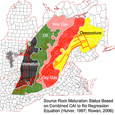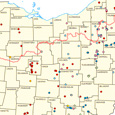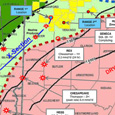Oil and gas leases: Know the basics
Friday, June 10, 2011
COLUMBUS — Q: What does it mean when a driller asks for an oil and gas lease on my property?
A: The driller is asking you to let him come on your land to drill for oil and/or gas so that it can be extracted and sold.
* * *
Q: What exactly is an oil and gas lease?
A: A lease is a document you sign to give the driller the right to use the surface of your land to choose a well site in order to drill underneath your property and extract the oil and/or natural gas located there.
Once you’ve signed the lease and a site is selected, the driller must get a permit from the State of Ohio, bring in a drilling rig, set it up and drill for oil and gas.
* * *
Q: If the driller finds oil and/or gas on my property, what happens next?
A: If the driller finds the oil and gas, he will complete the well and extract the oil and/or natural gas through the well hole that was dug and sell it.
If it is gas, the driller will build a small gas sales line to transport the gas to a transmission pipeline. If it is oil, the driller will put storage tanks on your land to store the oil until a truck can pick it up. Other equipment also may be required.
* * *
Q: Does the state regulate drillers?
A: Yes. All drilling operators are regulated by the Ohio Division of Mineral Resources Management.
* * *
Q: Assuming gas and/or oil are found underneath my property, what can I expect to receive?
A: For the present standard lease in Ohio, you can expect a small cash bonus payment and, normally, 12.5 percent of what the driller receives from sales. The costs of producing a well on your property are not deducted from this percentage, but severance taxes are deducted from your share of the sales.
Usually, you can also receive up to 300 mcf’s of “free gas” for use in your home. However, you are responsible for installing and maintaining the gas line to your home. There are both advantages and risks from taking free gas from a well located on your property for use in your home.
You should discuss the pros and cons of accepting free gas with an informed adviser.
* * *
Q: How long does the oil and gas lease last?
A: Normally, the first term lasts from one to five years to provide time for drilling. If a well is found and produces oil and/or natural gas, that producing well will automatically extend the lease until the well is no longer producing.
A well sometimes produces for many years.
* * *
Q: What happens when the well no longer produces?
A: If the well is no longer producing and no other well is included in the lease, the driller will plug and abandon the well, and you will own the mineral rights again.
* * *
Q: What is the chance that a driller might find a well on my Ohio property? A: If you have been asked for a lease on your property, the driller probably knows there is a reasonably good possibility of locating oil and/or natural gas on your property.
* * *
Q: What else should I know before a driller asks me to sign a lease?
A: Recently, drillers have come into Ohio to explore for much deeper and bigger wells than in the past. These large wells are known as the Marcellus or Utica shale wells because they are drilled to the Marcellus or Utica shale formations.
The companies drilling wells to these formations are typically large companies and can offer larger signing bonuses than have previously been offered to Ohioans.
You should be aware, however, that the risks associated with drilling deeper wells are different from those associated with drilling shallower wells (such as the “Clinton formation” wells that have been drilled in Ohio in past years).
Whenever you consider leasing your property to a driller, regardless of the well type, you should contact a lawyer who is familiar with oil and gas leases.
* * *
Q: Who should I contact for more information regarding Ohio’s regulation of oil and gas wells?
A: Contact the Ohio Department of Natural Resources, the Division of Mineral Resources Management at 614-265-6633. You can also contact the Ohio Farm Bureau at 614-249-2400 or visit www.ofbf.org.
(This information was provided by the Ohio State Bar Association, and prepared by Ronald K. Lembright and Anne Marie Christ, attorneys with the Akron firm of Roderick Linton Belfance, LLP; and William Taylor, an attorney with the Zanesville firm of Kincaid, Taylor & Geyer.)




